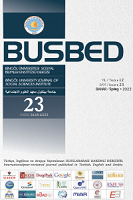PLATON’UN “DEVLET” VE “YASALAR” ESERLERİNDE HAKİKAT (ἈΛΉΘΕΙΑ) KAVRAMI VE BU KAVRAMIN EREK KÜLTÜRDEKİ YANSIMALARI
THE CONCEPT OF TRUTH (ἈΛΉΘΕΙΑ) IN PLATO’S “REPUBLIC” AND “LAWS” AND THE REPERCUSSIONS OF THIS CONCEPT ON THE TARGET CULTURE
Author(s): Serhat ArslanSubject(s): Philosophy, Ancient Philosphy, Philosophy of Law, Culture and social structure , Translation Studies
Published by: Bingöl Üniversitesi Sosyal Bilimler Enstitüsü
Keywords: Plato; Truth; Translation of Philosophical Texts; Republic; Laws;
Summary/Abstract: In this study we examined the concept of “truth (ἀλήθεια)” in “Republic”, which belongs to the mature period of Plato’s authorship and “Laws”, which belongs to his late period, and tried to clarify the philosopher’s understanding of “truth”. The concept of ἀλήθεια is one of the concepts that is examined and discussed through the whole history of philosophy and especially in the ancient philosophy. According to Plato, the main aim of human beings and gods is to search for the good, to find it and to live in accordance with it. The highest good is the truth and to achieve it one must walk through a hard and laboring way. In Plato’s philosophy ἀλήθεια that possess divine features, is one of the basic concepts of world of ideas and human beings can only comprehend totally what reflects the truth. While Plato construct the republic and the laws in a hypothetical fashion, he aims to justify his assumptions on the ground of truth, because if the main aim is to achieve the truth, he could not make an exception for “Republic” and “Laws”. Moreover, in this study we also tried to scrutinize some problems about the translation of the concept of ἀλήθεια like the loss of the original meaning in the source text.
Journal: Bingöl Üniversitesi Sosyal Bilimler Enstitüsü Dergisi (BUSBED)
- Issue Year: 12/2022
- Issue No: 23
- Page Range: 73-81
- Page Count: 9
- Language: Turkish

